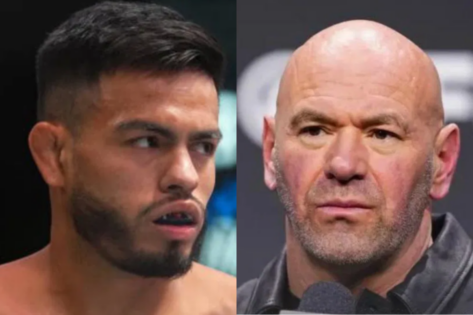Dana White frequently talks about being first. First to make fighters famous. First to provide them with a world-class training institute. In a recent interview, he proudly stated that he was among the first to give his fighters health insurance: “First guys ever to have health insurance… for the fighters.” It’s a plausible—even responsible—claim. However, what Brandon Royval just revealed regarding the concussion that forced him to withdraw from his fight with Manel Kape only brings the head honcho’s claims into question for sure. Why? Because Royval’s experience does not strike as a great example of care and recovery from an organization that claims to care for its fighters.
The flyweight contender said his concussion was so bad that he couldn’t even form sentences correctly. He would lose his train of thought in the middle of a statement and be unable to track objects with his eyes. “That was the weirdest thing of all,” he explained. “I would look this way, then that way, and my eyes would skip or go past it.” That isn’t a sore ankle or a strained muscle. That is cognitive impairment, which requires real-time, real rest, and genuine medical attention. And, while ‘Raw Dawg’ made the correct decision to withdraw, fans couldn’t help but wonder: in a promotion that says it puts fighter health first, how does it even get to that point?
Of course, Brandon Royval doesn’t blame anyone. In fact, he’s being quite open about it—perhaps more open than the UFC would like. But that’s the point. If Dana White’s health insurance scheme is as revolutionary as he says, shouldn’t fighters like Royval have noticed these signs sooner? Shouldn’t there be measures in place to detect when a fighter’s cognitive abilities deteriorate? The flyweight claims he was experiencing these symptoms after accepting the fight. That alone makes many wonder how much oversight occurs between fight announcements and fight night.
This is not about pointing fingers—’Raw Dawg’ is going to return soon, and the fight with Kape remains on the horizon. However, when a top-five fighter reveals that his brain function was affected to the point where he could not talk correctly, the conversation must shift. Health insurance is intended to serve as a safety net, not a marketing gimmick. And if someone like Brandon Royval, who has already fought for the title, still feels like he’s flying blind due to brain trauma, perhaps it’s time for the UFC to take a second look at how it actually protects its fighters—rather than simply claiming to. Fans surely would be glad that the flyweight pulled out at the right time and has finally now gotten what he desired the most.
Dana White reschedules Brandon Royval vs. Manel Kape
And now, with a clear head and his words back in order, Brandon Royval has what he was looking for all along: a rescheduled showdown with Manel Kape. The bout is now scheduled for UFC 317 during International Fight Week, which feels like poetic justice. ‘Raw Dawg’ was pushing himself to the limit to make that March match happen, and instead of pressing it, he backed off and waited. That difficult decision possibly saved his career, even his life. Now we have the Royval that fans—and Kape—deserve: fully recovered, focused, and dangerous as ever.
This clash is intriguing beyond its rankings. Royval creates chaos with purpose. What about his ground game? Surgical. How’s his pace? Relentless. But it is also worth noting that Manel Kape is more than simply a dazzling striker with a knockout reel; he is a menace. Kape’s head-kick knockout of Almabayev last month served as a reminder that he is not fooling around. He’s evolving. So, now that the fight is back on the books, both men enter with a sense of unfinished business.
And make no mistake: this is a war with massive implications. If ‘StarBoy’ wins, he advances from potential to contender—someone who may legitimately challenge Pantoja or whoever owns the championship this summer. But if Royval pulls this off, it says something deeper. That you can suffer, sit out, and heal while still coming out on top. Perhaps it also implies that withdrawing to protect your brain is not a weakness, but rather a strategy that allows you to continue fighting in the long run. Regardless, this is more than a flyweight battle. It’s a showdown between resilience and hunger. So, what do you think? Who will win the fight? Let us know in the comments.
The post “My Concussion Was So Severe”- Calls Mount on Flyweight’s Safety Years After Dana White’s Health Insurance Confirmation appeared first on EssentiallySports.
